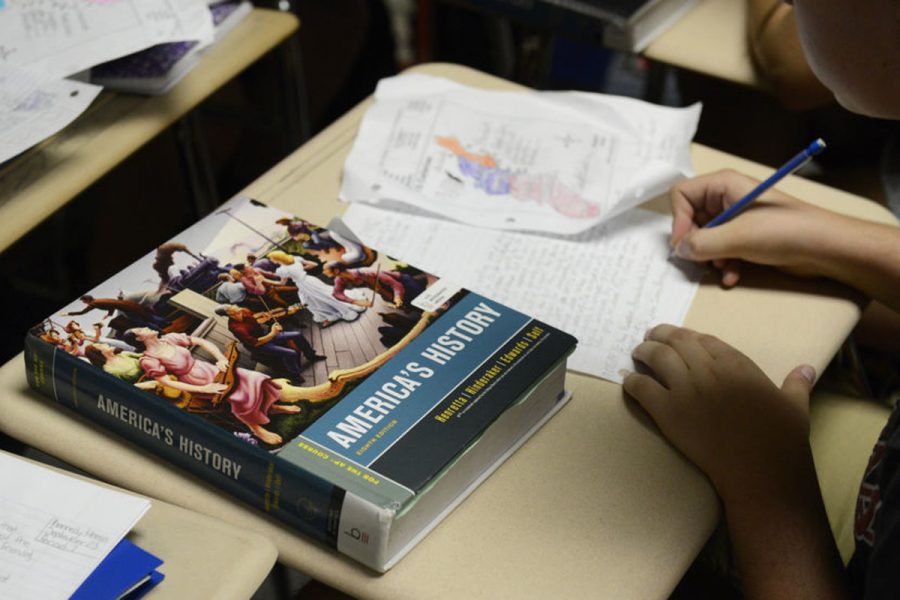By Margaret Hodson ’16, Perspectives Co Section Editor
Throughout the halls of Country Day, there has been a lot of grumbling about the College Board’s recent remake of the AP US History framework and exam. There have been complaints that the Long Essay Question time is too short and the Document Based Questions grading guidelines are too broad. Many decry that the difficulty of the test has been decreased to benefit of the average student at the detriment of the exceptional. Despite the many misgivings regarding the remake, consideration has hardly been given to ditching AP US History on the whole. Although Country Day stands firm in its decision to offer the class, the entire state of Oklahoma is not so sure.
On Monday, February 23, Oklahoma’s legislative committee on education voted 11-4 on a bill that would cut funding for AP US History from Oklahoma’s Department of Education budget. Instead, the Department of Education would create its own US History program and corresponding test. The framework would be mandated by law to include specific historical documents that must be taught in all classes, such as Johnathan Edwards “Sinners in the Hands of an Angry God” and George W. Bush’s “Address to the Nation” speech from 9/11. This addresses one of the main complaints about the College Board’s framework: that it is too broad, leaving out key people, events, documents, and influences. Others have conflated the course with the Common Core education standards that president of the College Board David Coleman helped to develop. Some opponents of APUSH claim that teaching the class would violate the Oklahoma legislation last year that repealed the Common Core.
Oklahoma isn’t the only entity objecting to the framework. Just last Friday, the Republican National Committee passed the resolution decrying the framework for its “biased and inaccurate view of many important events in American history, including the motivations and actions of 17th-19th-century settlers, American involvement in WWII, and the development of a victory in the Cold War.” The RNC also had issues with the “radically revisionist view of American history that emphasizes negative aspects of our nation’s history while omitting or minimizing positive aspects.” Specifically, the RNC noted that the Framework contains “little or no discussion” of key figures such as the Founding Fathers, military commanders, Dr. Martin Luther King. It also lacks thorough discussion of key documents such as the Declaration of Independence, key events such as the Holocaust, and key influences such as those stemming from religion. Many conservative groups have rallied behind the cause, including the national Association of Scholars, the American Principles Project, and Concerned Women for America. Lawmakers in other states such as Georgia, Texas, and South Carolina have also expressed concern over the new framework.
The College Board has not remained mute in regards to the criticism of its APUSH framework. College Board President David Coleman wrote an open letter addressing the concerns, and released publicly a full sample exam. He also wrote that contrary to tradition, the AP US History Exam will be released “each year to the teaching community for consideration and deliberation.” Mr. Coleman reminded opponents that the exams are not created by the College Board, but by “college professors and K-12 teachers throughout this country.” He also addressed the claim that the new framework leaves out key people such as the Founding Fathers. The letter reads, “People who are worried that AP U.S. History students will not need to study our nation’s founders need only take one look at this exam to see that out founders are resonant throughout…every question on the new AP U.S. History Exam now requires students to demonstrate an understanding of America’s important historical documents and leaders.” The College Board also claims that just because specific individuals and events are not mentioned in the framework does not mean they are insignificant or shouldn’t be taught by teachers. He wrote, “Instead, it is just a framework, requiring teachers to populate it with content required by their local standards and priorities.” Despite these statements defending their framework, Mr. Coleman wrote that the College Board would soon be releasing a “clarified version” to circumvent “any further confusion.” Mr. Coleman was also careful to distance himself from the framework, noting that he played no role in creating it and was not President of the College Board at the time it was drafted.
Although I understand their point of view, I almost completely disagree with the Oklahoman lawmakers that want to defund AP U.S. History. I do think the framework could benefit from more specifics, and certainly agree that there are certain people, events, documents, and ideologies which should be addressed by all teachers. I also take issue with some parts of the test, specifically that it has been made less rigorous to the detriment of exceptional students such as those regularly churned out by Mr. Peter Fossett and Mr. Eldrich Carr. Despite the exceptional nature of the classes of both these teachers, I imagine their classes are of the type the Oklahoman lawmakers would have a problem with. My APUSH class taught by Mr. Carr is currently studying imperialism and World War I, and we are fully exploring the complexity of these two topics. We are not skimming over the importance of “race thinking,” “male ethos,” or “American exceptionalism” in the spread of imperialism. We acknowledge the hypocrisy of a nation that champions self-determination only to force democracy upon other countries. We read in Norton about the “deep divisions among Americans” before and during WWI, “white versus black, nativist versus immigrant, capital versus labor, men versus women, radical versus Progressive and conservative, pacifist versus interventionist, nationalist versus internationalist.” In short, we do not ignore the unpleasant parts of history. I believe a course can teach the dark parts of American history without adopting a tone of negativity and abandoning patriotism. This is because in the end—despite of and in light of unpleasant truths—I believe America is a great nation. The Oklahoman lawmakers seem to believe that if students learn the truth about the negative aspects of America’s past, they will cease to be patriotic citizens. This is frankly an insult to both students and the history of our nation. We are a nation of lofty ideals—ideals that we sometimes fail to meet because of their height and our humanity.
It disgusts me to read about the many violations of human rights perpetrated by Americans throughout time, but it gives me hope that we are willing to speak about them. We do not hide our Tiananmen Square equivalents but write them into our history books for all to read. We may be ashamed of parts of our past, but we should not deny these parts of ourselves. To erasure the past is to paint an untrue and imperfect picture of our fine nation. History has always been written by the winners, and for most of time that had been heterosexual white men of a mainstream Christian religion. We hear and we know their stories, but to erase the unpleasant parts of history is often to erasure the marginalized and their struggles. We need to hear their views about America, so we can avoid making the same mistakes in the future. It is also naïve to assume that the marginalized have only negative things to say about America. Yes, erasing the struggles of 19th Century immigrants allows us to ignore the racist Nativism which has reared its ugly head during many parts of American history. But to ignore these immigrants is also to ignore the hope and promise they saw in coming to America, the opportunities they had to build and better life.
As I mentioned before, I am currently taking an APUSH class that I believe fully and critically examines American history—the good and the bad. The course has not made me hate America or abandon my patriotism. I have a stronger sense of the ideals behind our nation, and a firmer conviction that I agree thoroughly with our lofty ideals. Despite or even because of our failures past and present, I want to play a role in bringing our lofty ideals to fruition, as a good citizen of the Republic or even as a leader. Many Oklahomans and students across the nations share my concerns. There have been cries of outrages from not just Oklahoman students and teachers, but proponents of AP US History all across the nation. I believe getting rid of AP US History would be a huge mistake. If we want to produce patriotic American citizens, all we need to do it teach them the truth about our nation’s past.






